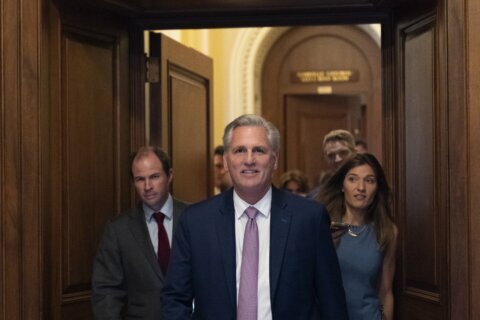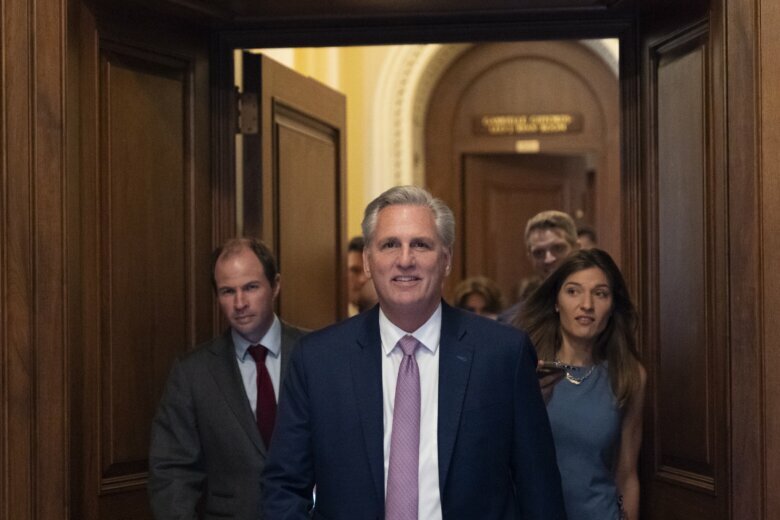
House Minority Leader Kevin McCarthy is finalizing a House GOP roster for a Democratic-led investigation into the deadly January 6 insurrection, canning the idea of a boycott on adding Republicans to the panel on the theory that it’s better to join in and play an active defense.
Initially, there was an internal debate inside the House GOP about whether the California Republican should appoint members to the select committee or just skip it altogether as a way to paint the entire effort as partisan. But McCarthy indeed plans to place Republicans on the high-profile panel, CNN has learned, according to multiple GOP sources familiar with his intentions, and is in the process of making his selections. The thinking among Republicans is that the perch will enable them to shape a counternarrative to a probe that could ensnare not only Donald Trump, but also other members of their party.
And while McCarthy is almost certain to tap some trusted Trump allies for one of the five Republican spots on the committee, he is facing increased pressure to also pick some more pragmatic members for the job who can help bring credibility to their side of the debate. Some GOP sources even think it would be a smart political move for McCarthy to select at least one member who voted to certify the presidential election results in order to help inoculate against some of the criticism from Democrats.
That is especially true after House Speaker Nancy Pelosi chose a Republican, Rep. Liz Cheney of Wyoming, as one of her eight selections for the congressional probe — a move designed to win bipartisan buy-in for their investigative work and sell a polarized public on their findings. Plus, the California Democrat has made clear that she has veto power over McCarthy’s picks, though it’s unclear under what circumstances she’d be willing to use it.
Who McCarthy ultimately taps for the select panel will set the tone for a partisan brawl that is almost certain to drag into 2022, which is why he wants to strike the right balance with his picks. And it could have far-reaching implications in the battle for the House, where Republicans have history and redistricting on their side but could be dogged by uncomfortable questions about Trump and the deadly Capitol riots in the run-up to the midterms.
“If you don’t (appoint Republicans), the reality is, then there’s only one news story,” said Rep. Kelly Armstrong, a Republican from North Dakota. “I’ve never been a ‘take your ball and go home’ type of guy.”
Yet the time line for McCarthy’s decision remains unclear, though GOP sources think it could come soon. As Pelosi noted last week, the January 6 panel now has a quorum, so it can begin its work with or without McCarthy’s picks, meaning there’s little incentive for him to slow-walk his selections.
GOP contenders start to emerge
While some in the GOP would have preferred that their party not participate in the probe, others, including McCarthy, would rather have Republicans in a position where they can readily push back on Democrats in high-profile hearings and potentially even write a minority report in the end.
But McCarthy is likely to steer clear of choosing the most controversial firebrands in the party, such as Reps. Marjorie Taylor Greene of Georgia or Matt Gaetz of Florida, who would be harder for the Republican leader to control and could undermine the GOP’s strategy.
Instead, McCarthy is likely to tap lawmakers whom he feels he can rely on or who have proven track records when it comes to defending Trump, including those who led the charge to overturn the election results in Congress.
Rep. Jim Jordan of Ohio, a staunch Trump ally whom McCarthy has used as an attack dog in other high-profile assignments, is seen as an obvious choice inside the House GOP conference. But Jordan already has a full plate: He is the top Republican on the House Judiciary Committee, chairs a brand-new GOP task force and serves on the coronavirus select committee.
In a similar vein, there’s now-House GOP Conference Chairwoman Elise Stefanik of New York, who was propelled to GOP stardom and became a fundraising powerhouse after furiously defending the-then President during the first impeachment; Rep. Jim Banks of Indiana, a McCarthy ally and the ambitious chairman of the conservative Republican Study Committee; and Rep. Mike Johnson of Louisiana, a member of GOP leadership and a former constitutional law attorney who served as one of Trump’s impeachment surrogates in 2019.
If McCarthy doesn’t name Stefanik, he will face pressure to select another woman. Rep. Jackie Walorksi of Indiana, the ranking GOP member on the House Ethics Committee, who was interested in running for leadership earlier this year, is considered another contender for the assignment.
Some Republicans think McCarthy should choose Republicans who sit on the House Administration Committee, which oversees the Capitol’s day-to-day operations, or have expertise in national security, law enforcement or legal matters. One GOP lawmaker said it should be someone who has a grasp on “security procedures” and “can give thoughtful context to the types of things that we need, as a physical feature of the city, but also a unit of government.”
Other names that have been floated include Reps. Brad Wenstrup of Ohio, a US Army Reserve member who sits on the House Intelligence Committee and was on the field during the GOP baseball shooting in 2017; John Rutherford of Florida, a former Jacksonville sheriff; and Markwayne Mullin of Oklahoma, a former professional mixed martial arts fighter who also sits on the intelligence panel.
McCarthy, however, may be inclined to appoint a lawmaker who voted to certify the 2020 presidential election results and therefore could have more sway with moderate pockets of the country. Potential members on that list include Armstrong, a former state party chairman, as well as Reps. Brian Fitzpatrick of Pennsylvania, who co-chairs the bipartisan Problem Solvers Caucus and supported an independent commission on January 6; and Tom McClintock of California, a veteran lawmaker who serves on the House Judiciary Committee.
But a major challenge for McCarthy is that many House Republicans, especially those in tough reelection races, want to avoid the politically fraught assignment at all costs. Fitzpatrick and Armstrong, however, both told CNN they would serve on the panel if asked — even though they oppose the select committee.
Broader strategy takes shape
Other elements of the GOP’s game plan are beginning to take shape. Republicans are already casting the investigation as a politically motivated probe that Democrats are just trying to use to damage Trump and the GOP ahead of the midterm elections — similar to the playbook they deployed during Trump’s first impeachment, when they relied heavily on process arguments.
Democrats, however, said they were given no choice but to establish a select committee after the Senate GOP blocked an independent commission that would have tasked outside experts with investigating the insurrection. And even under the select panel format, Democrats maintain they are motivated only by finding the truth and preventing another violent siege of the Capitol — not going after their political opponents.
Republicans are also signaling that they want to focus on the steps that Pelosi took — or didn’t take — to secure the Capitol that day. They also are expected to call attention to political violence on the left, including last summer’s protests that broke out in response to police brutality.
GOP lawmakers will likely be looking to derail the Democrats’ investigation at every turn. And that may mean defying subpoenas, which Democrats have said they could issue in order to force Trump or other Republicans to testify about the ex-President’s mindset and conduct on the day of the riots.
“They should go wherever the facts lead. They may be able to get what they want and need without him testifying,” House Majority Whip Jim Clyburn, a South Carolina Democrat, told CNN’s Dana Bash on “State of the Union.” “I would not want to see a former President testify in such a situation as this, but if that’s what it takes in order to get to the bottom of this.”








